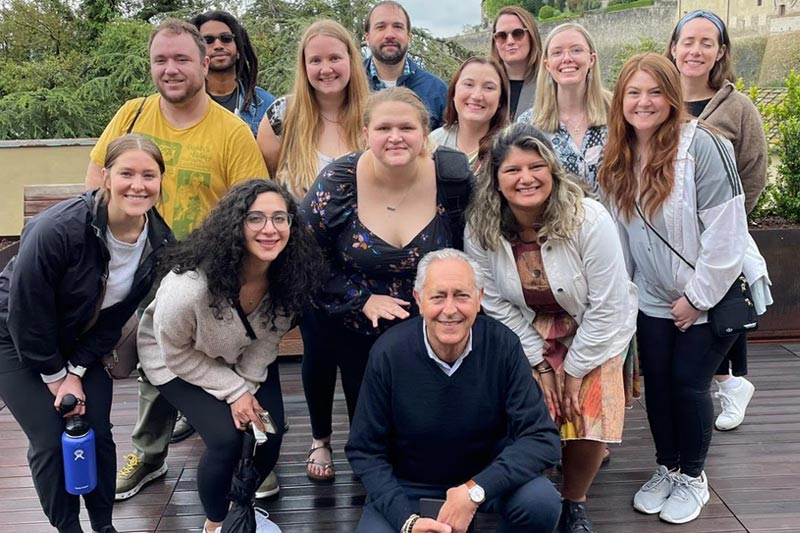Identity-Based Resources for Study Abroad: Gender
I/O Psychology in Italy group, summer 2022
Gender roles, expectations, and expression may differ between countries and cultures. In some cases, the gender roles or customs you encounter abroad may not align with your own views on gender. In particular, women, transgender, gender nonconforming, gender-queer, or non-binary people may have a different experience with their gender abroad than at home. This could impact your decisions about where you travel, how you dress, or what precautions you take while abroad.

I/O Psychology in Italy group, summer 2022
This section discusses gender abroad, but transgender, non-binary, gender nonconforming, or gender-queer students may also want to look at the LGBTQIA+ resource page.
For example, you may find that standards for modesty in other countries are different than in the United States. By researching these differences before you depart for your program, you can understand what cultural signals your choices about dress or modesty may send and how those could impact your time or safety in your host country.
Unfortunately, sexism, toxic masculinity, homophobia, and transphobia exist not only in the United States but around the world. Have you considered how you want to navigate these issues in order to keep yourself safe while having a fulfilling study abroad experience?
Becoming informed about how your gender identity may impact your time on a study abroad program will allow you to be prepared for your travel, stay safe, maintain positive levels of self-care, and still express yourself and your gender in a way that makes you feel authentic and comfortable.
Questions to Consider
- What are typical gender roles, customs, or laws in my host country? Are there differences in political or social power or privilege based on gender?
- How do various gender identities interact in my host country, both platonically and romantically? Are there typical social patterns or customary gender relations?
- How are gender nonconforming people viewed in my host country?
- How do my views on gender compare with the majority of those in my host country?
- Are there any safety concerns or issues related to my gender in my host country? How are issues of gender-based violence viewed and addressed in my host country?
- How will I continue to nurture forms of self-care, self-affirmation, and connection while abroad? Do I need to seek out communities or support within my study abroad program?
Additional Considerations
- Dynamics among genders are different in different countries abroad.
- Students may encounter attitudes that they find disrespectful or more restrictive.
- Alternatively, students may find more freedom to express themselves or be who they are abroad.
- Dynamics in big cities vs. small towns differ.
- Observe how local women and LGBTQIA+ folks act in the spirit of learning.
- Communicate with study abroad staff if you ever feel unsafe or are in an uncomfortable situation. We’ll do everything we can to listen and give you agency in resolving the concern.
Resources
- IES Country-Specific Identity Resources
- Women Going Abroad | Diversity Abroad
- JourneyWoman
- OnSheGoes Apple Podcast
- U Go Gurl (a resource by and for Black women traveling abroad)
- OneikaTheTraveller (a resource by and for Black women traveling abroad)
- Gender – Study Abroad | NC State University
- Information for Women Travelers | U.S. Department of State


